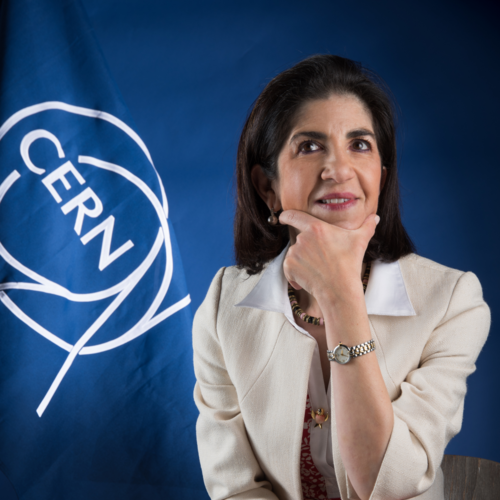
Fabiola Gianotti (ITA)
Director-General of CERN
Fabiola Gianotti is the Director-General of CERN, the European laboratory for particle physics. She is not only the first woman in this role, but also the first CEO in CERN’s history who has been reappointed for a full second term.
Fabiola received a Ph.D. in experimental particle physics from the University of Milan, Italy.
Since 1994, she has been a research physicist at CERN. She has worked on several CERN experiments, covering detector R&D and construction, software development and data analysis. A large part of her work was devoted to the search for the Higgs boson.
From 2009 to 2013, she held the position of project leader (”Spokesperson”) of the ATLAS experiment. On 4 July 2012, she presented the ATLAS results on the search for the Higgs boson in a seminar at CERN that saw the formal announcement of the discovery of this particle by the ATLAS and CMS experiments.
Dr Gianotti served on several international committees and received fourteen honorary
doctoral degrees from universities across the world. She is a foreign member of eight
academies of science worldwide. She was also awarded the honour of “Cavaliere di Gran Croce dell’Ordine al Merito della Repubblica Italiana”. She shared the Special Breakthrough Prize in Fundamental Physics and the Enrico Fermi Prize of the Italian Physical Society, and received the Medal of Honour of the Niels Bohr Institute (Copenhagen), the Wilhelm Exner Medal (Vienna) and the Tate medal of the American Institute of Physics for International Leadership.
Fabiola Gianotti was included among the Guardian's “Top 100 most inspirational women” in
2011, ranked 5th in Time magazine’s Personality of the Year in 2012, and included among the “Top 100 most influential women” by Forbes magazine, USA (2013 and 2017).
The Higgs boson in our life
20. 7. 2024 17:30 - 18:30
People at CERN, the European laboratory for particle physics, study the smallest constituents of matter and the Universe and the laws of nature at the most fundamental level. They do so by building and operating very complex, advanced instruments (particle accelerators and detectors) and by developing cutting-edge technologies in many domains, from superconducting magnets to electronics, cryogenics, vacuum techniques, artificial intelligence, and quantum technologies, some of which have revolutionised society and our day-by-day life. Finally, CERN is a brilliant example of collaboration across borders with its community of 17,000 people from all over the world and more than 110 nationalities represented. This presentation covers CERN’s mission and objectives, with particular emphasis on the Higgs boson, its role in the early universe and its importance for our own existence.